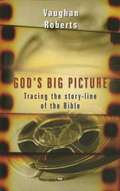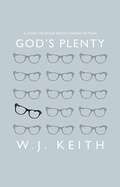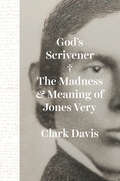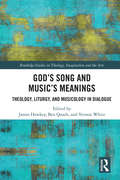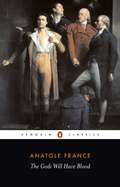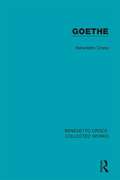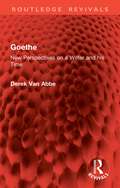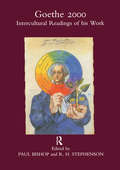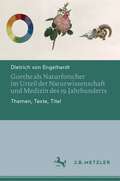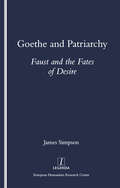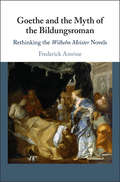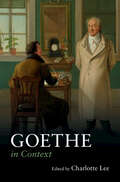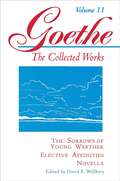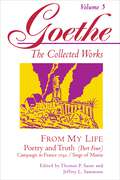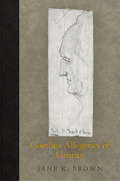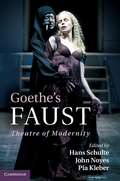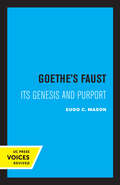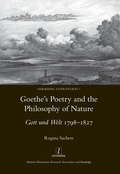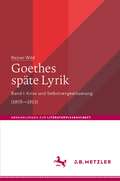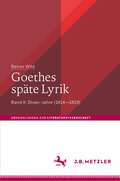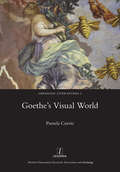- Table View
- List View
God's Big Picture: Tracing the Storyline of the Bible
by Vaughan RobertsSixty-six books written by forty people over nearly 2,000 years, in two languages and several different genres. A worldwide bestseller published in countless sizes and bindings, translations and languages. Sworn by in court, fought over by religious people, quoted in arguments. The Bible is clearly no ordinary book. How can you begin to read and understand it as a whole?In this excellent overview, Vaughan Roberts gives you the big picture--showing how the different parts of the Bible fit together under the theme of the kingdom of God. He provides both the encouragement and the tools to help you read the Bible with confidence and understanding. And he points you to the Bible's supreme subject, Jesus Christ, and the salvation God offers through him.
God's Gift of Language A
by Phyllis RandGod's Gift of Language A Writing & Grammar Work-text Phyllis Rand Ed. D.
Gods Gift of Language C: Writing and Grammar Work-Text
by Phyllis RandGods Gift of Language C: Writing and Grammar Work-Text, Third Edition by Phyllis Rand.
God's Plenty: A Study of Hugh Hood's Short Fiction
by W. J. KeithA companion volume to Canadian Odyssey: A Reading of Hugh Hood's The New Age, God's Plenty surveys the short fiction of the writer dubbed Canada's Proust. Hugh Hood, an unparalleled stylist, was equally accomplished in short forms and long: this straight-talking assessment of Hood's stories is thorough, insightful, readable, and profound. With its story-by-story breakdown and rigorous engagement with Hood's technique, God's Plenty offers an excellent introduction not just to an undersung master, but to the art of short fiction full stop.W.J. Keith is a professor emeritus at the University of Toronto.
God's Scrivener: The Madness and Meaning of Jones Very
by Clark DavisA biography of a long-forgotten but vital American Transcendentalist poet. In September of 1838, a few months after Ralph Waldo Emerson delivered his controversial Divinity School address, a twenty-five-year-old tutor and divinity student at Harvard named Jones Very stood before his beginning Greek class and proclaimed himself “the second coming.” Over the next twenty months, despite a brief confinement in a mental hospital, he would write more than three hundred sonnets, many of them in the voice of a prophet such as John the Baptist or even of Christ himself—all, he was quick to claim, dictated to him by the Holy Spirit. Befriended by the major figures of the Transcendentalist movement, Very strove to convert, among others, Elizabeth and Sophia Peabody, Bronson Alcott, Nathaniel Hawthorne, and most significantly, Emerson himself. Though shocking to some, his message was simple: by renouncing the individual will, anyone can become a “son of God” and thereby usher in a millennialist heaven on earth. Clark Davis’s masterful biography shows how Very came to embody both the full radicalism of Emersonian ideals and the trap of isolation and emptiness that lay in wait for those who sought complete transcendence. God’s Scrivener tells the story of Very’s life, work, and influence in depth, recovering the startling story of a forgotten American prophet, a “brave saint” whose life and work are central to the development of poetry and spirituality in America.
God's Scrivener: The Madness & Meaning of Jones Very
by Clark DavisA biography of a long-forgotten but vital American Transcendentalist poet. In September of 1838, a few months after Ralph Waldo Emerson delivered his controversial Divinity School address, a twenty-five-year-old tutor and divinity student at Harvard named Jones Very stood before his beginning Greek class and proclaimed himself “the second coming.” Over the next twenty months, despite a brief confinement in a mental hospital, he would write more than three hundred sonnets, many of them in the voice of a prophet such as John the Baptist or even of Christ himself—all, he was quick to claim, dictated to him by the Holy Spirit. Befriended by the major figures of the Transcendentalist movement, Very strove to convert, among others, Elizabeth and Sophia Peabody, Bronson Alcott, Nathaniel Hawthorne, and most significantly, Emerson himself. Though shocking to some, his message was simple: by renouncing the individual will, anyone can become a “son of God” and thereby usher in a millennialist heaven on earth. Clark Davis’s masterful biography shows how Very came to embody both the full radicalism of Emersonian ideals and the trap of isolation and emptiness that lay in wait for those who sought complete transcendence. God’s Scrivener tells the story of Very’s life, work, and influence in depth, recovering the startling story of a forgotten American prophet, a “brave saint” whose life and work are central to the development of poetry and spirituality in America.
God’s Song and Music’s Meanings: Theology, Liturgy, and Musicology in Dialogue (Routledge Studies in Theology, Imagination and the Arts)
by James Hawkey Ben Quash Vernon WhiteTaking seriously the practice and not just the theory of music, this ground-breaking collection of essays establishes a new standard for the interdisciplinary conversation between theology, musicology, and liturgical studies. The public making of music in our society happens more often in the context of chapels, churches, and cathedrals than anywhere else. The command to sing and make music to God makes music an essential part of the DNA of Christian worship. The book’s three main parts address questions about the history, the performative contexts, and the nature of music. Its opening four chapters traces how accounts of music and its relation to God, the cosmos, and the human person have changed dramatically through Western history, from the patristic period through medieval, Reformation and modern times. A second section examines the role of music in worship, and asks what—if anything—makes a piece of music suitable for religious use. The final part of the book shows how the serious discussion of music opens onto considerations of time, tradition, ontology, anthropology, providence, and the nature of God. A pioneering set of explorations by a distinguished group of international scholars, this book will be of interest to anyone interested in Christianity’s long relationship with music, including those working in the fields of theology, musicology, and liturgical studies.
The Gods Will Have Blood: (Les Dieux Ont Soif)
by Anatole France Frederick DaviesIt is April 1793 and the final power struggle of the French Revolution is taking hold: the aristocrats are dead and the poor are fighting for bread in the streets. In a Paris swept by fear and hunger lives Gamelin, a revolutionary young artist appointed magistrate, and given the power of life and death over the citizens of France. But his intense idealism and unbridled single-mindedness drive him inexorably towards catastrophe. Published in 1912, The Gods Will Have Blood is a breathtaking story of the dangers of fanaticism, while its depiction of the violence and devastation of the Reign of Terror is strangely prophetic of the sweeping political changes in Russia and across Europe.
Goethe: Con Una Scelta Delle Liriche Nuovamente Tradotte (classic Reprint) (Collected Works)
by Benedetto CroceCroce admired Goethe partly because the latter possessed a knowledge of human nature in all its aspects but nonetheless kept his mind above and beyond political sympathies and the quarrels of nations. In this volume originally published in English in 1923, Croce distils his critical ideas about Goethe with the aim of helping readers to better understand the German poet’s work.
Goethe: New Perspectives on a Writer and his Time (Routledge Revivals)
by Derek Van AbbeFirst published in 1972, Goethe presents a biography looking at one of the few great Europeans to be universally recognized as a hero of culture, and in the light of modern sociological thought puts the hero into his background, human, social and political. Goethe is seen in the context of his times- not as the Great Poet or the Great Lover but as the worried contemporary of the French Revolution and Napoleon. The author is much more interested than most biographers in the mature Goethe and the problems of the poet’s old age. This stems from his intense preoccupation with Goethe’s friend and biographer Eckermann, whose Conversations (for which Eckermann is ranked by many with Boswell) he is re-editing.This is an interesting read for scholars of German language & literature and European literature.
Goethe 2000: Intercultural Readings of His Work
by Paul Bishop"The two-hundred-and-fiftieth anniversary of the birth of Johann Wolfgang von Goethe was celebrated in Scotland by a colloquium held under the auspices of the University of Glasgow's Centre for Intercultural Germanistics in April 1999. Its aim was to reflect both Goethe's own commitment to Weltliteratur and the pressing need in our global village at the turn of the millennium for cultural exchange between scholars of different nations. For if, as Goethe said, 'wer fremde Sprachen nicht kennt, weis nichts von seiner eigenen', then it is also true that 'wer fremde Kulturen nicht kennt; weis nichts von seiner eigenen'.Discussing different themes, different texts, and working with different methodological presuppositions, the papers in this collection nevertheless share the conviction that the significance of Goethe for the new millennium can best be shown by setting his works in an intercultural context. The volume also includes John Michael Krois' Inaugural Ernst Cassirer Lecture in Intercultural Relations, held in the University of Glasgow in April 2000, entitled 'Ernst Cassirer and the Renaissance of Cultural Theory'."
Goethe als Naturforscher im Urteil der Naturwissenschaft und Medizin des 19. Jahrhunderts: Themen, Texte, Titel
by Dietrich von EngelhardtGoethe als Naturforscher findet bei deutschen und ausländischen Naturforschern und Medizinern des 19. Jahrhunderts durchgängig Beachtung und führt zu einer Fülle spezifischer Goethe in dieser Hinsicht gewidmeten Studien mit Interpretationen und Beurteilungen – neben wiederholt vorkommenden knapperen Ausführungen oder kurzen Hinweisen in naturwissenschaftlichen und medizinischen Publikationen der Zeit. Übergreifende Veröffentlichungen über Goethe und die Romantik, über seine Stellung in Europa, über seine Beziehungen zu England, Frankreich, Italien, Spanien, den skandinavischen und slavischen Ländern behandeln meist nur seine literarischen und geisteswissenschaftlichen Werke und gehen allenfalls begrenzt auf seine naturwissenschaftlichen Beiträge und ihre Aufnahme in den Naturwissenschaften und Medizin ein. Diese fachspezifische Zurückhaltung gilt auch für Bibliographien der Übersetzungen deutscher Veröffentlichungen des 19. Jahrhunderts in europäische Sprachen; naturwissenschaftliche und medizinische Publikationen kommen in ihnen nicht oder nur sporadisch vor. Der vorliegende Band schließt diese Lücke. Neben einer umfassenden Bibliographie von 260 Titeln von Naturwissenschaftlern und Medizinern über Goethe als Naturforscher steht eine Wiedergabe von 48 entsprechenden nicht nur deutschen, sondern vor allem auch internationalen und oft an entlegenen Orten erschienenen Arbeiten.
Goethe and Patriarchy: Faust and the Fates of Desire
by James Simpson"This book traces the history of a complex sexual fantasy which features recurrently in Goethe's writings from his days as a student in Leipzig to the final years as Europe's most celebrated living poet. Simpson shows how the young man's fantasy of innocent sexuality became an increasingly troubled one during the poet's first decade in Weimar. Goethe began to recognize in it a submerged element: the incestuous roots of desire. Triggered by this discovery, Goethe's imagination becomes increasingly analytic and diagnostic, and startlingly prefigures the work of Freud. Yet, paradoxically, Goethe's insight leads him to a triumphant reassertion of an innocent sexuality purged of those elements he identifies as 'diseased'. Central to ""Goethe and Patriarchy"" is a new account of the genesis of the first part of ""Faust"", which is shown to contain a record of Goethe's changing attitudes to human sexuality. In particular, Simpson is the first critic to demonstrate that the Gretchen episode is a deliberate ""Kontrafaktur"" of the patriarchal idyll of the ""Song of Songs"". The book explores numerous other Goethe texts and casts entirely new light on his creative imagination."
Goethe and the Myth of the Bildungsroman: Rethinking the Wilhelm Meister Novels
by Frederick AmrineGoethe's Willhelm Meister novels, widely held to be the most significant and influential in all of German literature, have traditionally been classed as Bildungsroman, or 'novels of formation'. In Goethe and the Myth of Bildungsroman, Frederick Amrine offers a unique reading of Wilhelm Meister's Lehrjahre and Wilhelm Meister's Wanderjahre, which posits the second novel as a sequel to the first. Deconstructing and jettisoning the notion of the Bildungsroman, the features of the novels which have historically proved problematic for critics, seeming to testify to the novels' disunity, become instead the articulation points of a subtle concord between thematic and formal elements. Reading the novels in light of the eminent criticism of Northrop Frye, this book productively shifts away from social commentary towards the archetypal and symbolic, showing Goethe not to be an exception within world literature; rather, that he participates deeply in its overarching structures.
Goethe in Context (Literature in Context)
by Charlotte LeeOne of the most prolific and versatile writers of all time, Johann Wolfgang Goethe (1749–1832) made an impact that continues to extend far beyond his native Germany. The variety of human questions and experiences treated in his works is arguably without parallel. He also had (for his era) an unusually long life, which spanned the French Revolution, the end of the Holy Roman Empire and subsequent reshaping of the German-speaking world, and the rapid onset of industrial modernity. In thirty-seven short essays, leading international scholars explore Goethe's life and times, his literary works, his activity in the realms of art, philosophy and natural science, his reception of – and indeed by – other cultures, and, finally, the resonance of his work in our time. The aim of this collection is to open as many windows as possible onto Goethe's wide-ranging intellectual and practical activity, and to give a sense of his ongoing importance.
Goethe, Volume 11: The Sorrows Of Young Werther--elective Affinities--novella
by Judith Ryan Johann Wolfgang von Goethe David E. Welbery Victor LangeContaining three of Goethe's major prose works, this volume explores a range of themes: unfulfilled love, infidelity, divorce, tragic love, fantasy, and moral rebirth. One of Goethe's best known works, The Sorrows of Young Werther, explores the extremes of the subjective experience through the novel's depiction of a sensitive young man caught up in a love impossible to fulfill. In Elective Affinities, a novel of tragic love, Goethe employs all the requisites of sentimental romance to give a deeply ironic perspective to the idea of love. As the title indicates, Novella examines the possibilities inherent in this genre.
Goethe, Volume 5: From My Life: Campaign in France 1792-Siege of Mainz
by Johann Wolfgang von GoetheAn authoritative English translation of Goethe&’s classic autobiographical account of war and conquest in the age of revolutionIn August 1792, Goethe accompanied Karl August, Grand Duke of Saxe-Weimar-Eisenach, during the Prusso-Austrian invasion of revolutionary France to restore Louis XVI as king. After the Cannonade of Valmy that September, the German armies were forced to retreat, never again to threaten the heart of France until the end of the Napoleonic era. The French subsequently invaded the Rhineland and captured the city of Mainz, claiming it for the French Republic. When German armies besieged Mainz, Goethe witnessed the capture of the city at the close of 1793.Goethe&’s narrative of these events has become a classic text for the history of Franco-German relations during the revolutionary period. A product of recollection, historical hindsight, and considerable study of other published sources, it is a fascinating document of the military catastrophe exposing the decline of Prussian power since the death of Frederick II, which eventually culminated in Napoleon&’s devastating 1806 victory at Jena and Auerstedt.
Goethe's Allegories of Identity
by Jane K. BrownA century before psychoanalytic discourse codified a scientific language to describe the landscape of the mind, Johann Wolfgang von Goethe explored the paradoxes of an interior self separate from a conscious self. Though long acknowledged by the developers of depth psychology and by its historians, Goethe's literary rendering of interiority has not been the subject of detailed analysis in itself. Goethe's Allegories of Identity examines how Goethe created the essential bridge between the psychological insights of his contemporary, Jean-Jacques Rousseau, and the psychoanalytic theories of his admirer Sigmund Freud.Equally fascinated and repelled by Rousseau's vision of an unconscious self, Goethe struggled with the moral question of subjectivity: what is the relation of conscience to consciousness? To explore this inner conflict through language, Goethe developed a unique mode of allegorical representation that modernized the long tradition of dramatic personification in European drama. Jane K. Brown's deft, focused readings of Goethe's major dramas and novels, from The Sorrows of Young Werther to Elective Affinities, reveal each text's engagement with the concept of a subconscious or unconscious psyche whose workings are largely inaccessible to the rational mind. As Brown demonstrates, Goethe's representational strategies fashioned a language of subjectivity that deeply influenced the conceptions of important twentieth-century thinkers such as Freud, Michel Foucault, and Hannah Arendt.
Goethe's Faust
by Pia Kleber Hans Schulte John NoyesFaust has been called the fundamental icon of Western culture, and Goethe's inexhaustible poetic drama is the centrepiece of its tradition in literature, music and art. In recent years, this play has experienced something of a renaissance, with a surge of studies, theatre productions, press coverage and public discussions. Reflecting this renewed interest, leading Goethe scholars in this volume explore the play's striking modernity within its theatrical framework. The chapters present new aspects such as the virtuality of Faust, the music drama, the modernization of evil, Faust's blindness, the gay Mephistopheles, classic beauty and horror as phantasmagoria, and Goethe's anticipation of modern science, economics and ecology. The book contains an illustrated section on Faust in modern performance, with contributions by renowned directors, critics and dramaturges, and a major interview with Peter Stein, director of the uncut 'millennium production' of Expo 2000.
Goethe's Faust: Its Genesis and Purport
by Eudo C. MasonThis title is part of UC Press's Voices Revived program, which commemorates University of California Press’s mission to seek out and cultivate the brightest minds and give them voice, reach, and impact. Drawing on a backlist dating to 1893, Voices Revived makes high-quality, peer-reviewed scholarship accessible once again using print-on-demand technology. This title was originally published in 1967.
Goethe's Poetry and the Philosophy of Nature: Gott Und Welt 1798-1827
by Regina SachersAt the beginning of the nineteenth century, philosophy and theology come under increasing pressure owing to the emergence of the modern sciences. The collection Gott und Welt is Goethe's poetic contribution to this conflict, in which an alternative to orthodox Christianity was being sought. Following the collection's various stages of composition and publication, this study offers new readings of some of Goethe's best known poems: 'Die Metamorphose der Pflanzen', 'Dauer im Wechsel', 'Urworte. Orphisch' and 'Wiederfinden'. Sachers shows that Gott und Welt is the long poem on nature which Goethe attempted to write for the last third of his life. As such it represents Goethe's unique answers to the intellectual challenges posed by the dawning age of science. Regina Sachers is Lecturer in German at Exeter College, Oxford.
Goethes späte Lyrik: Band I: Krise und Selbstvergewisserung (1805–1813) (Abhandlungen zur Literaturwissenschaft)
by Reiner WildBand I von Reiner Wilds Gesamtdarstellung der Alterslyrik Goethes behandelt die Zeitspanne zwischen dem Todesjahr Schillers 1805 und 1813/14, dem Ende der napoleonischen Ära. Der Autor zeigt, dass sich Goethes Dichtungsverständnis nach 1805 grundlegend ändert, von der Lyrik des subjektiven Ausdrucks hin zum Gedicht als Medium der Kommunikation. Die Mehrzahl der ca. 150 Gedichte dieser Zeit sind Gelegenheitsgedichte, vor allem Gedichte an Personen, und Lieder zu geselligen Anlässen. Hinzu kommt eine Reihe von Balladen, in denen sich Goethe mit den Zeittendenzen auseinandersetzt. Zu den Neuerungen dieser Jahre gehört Goethes Interesse an Spruchdichtung, deren Produktion vor allem nach 1810 stetig zunimmt. Mit der Analyse der Gedichte und ihrer Entstehungs- und Verwendungszusammenhänge entsteht ein neues, differenzierteres Bild von Goethes lyrischem Alterswerk.
Goethes späte Lyrik: Band II: Divan-Jahre (1814–1819) (Abhandlungen zur Literaturwissenschaft)
by Reiner WildBand II von Reiner Wilds Gesamtdarstellung der Alterslyrik Goethes gilt den Jahren 1814 bis 1819. Lyrisches Hauptgeschäft ist der West-östliche Divan (1819). Goethes bedeutendste Gedichtsammlung ist ein Werk der interkulturellen Begegnung mit dem Orient und zugleich einer der großen Liebeslyrikzyklen der europäischen Dichtung. Darüber hinaus werden Religion, Politik, Geschichte und nicht zuletzt die Dichtung selbst verhandelt. Neben den Divan treten Geselligkeitslyrik und Sprüche sowie vor allem Lehrdichtung zu naturwissenschaftlichen und philosophischen Themen. Auffällig ist die Gruppierung in Ensembles und die Inszenierung von Kommunikation mit den Lesern. Teile dieses späten Schaffens, das Goethe oftmals zuerst in seinen Zeitschriften veröffentlicht, gehören nicht in den klassischen Kanon und wurden bisher nur marginal behandelt. Band II erschließt diese Werke nun umfassend als Gegenstand literaturwissenschaftlicher Analysen
Goethe's Visual World
by Pamela CurrieGoethe's ideas on colour and imagery crossed many borderlines: those of artistic processes and philosophical aesthetics, art history and colour theory, together with the science of perception. This investigation into his writings ranges across art from Antiquity, the Renaissance and the eighteenth century, as well as exploring the centrality of these issues to Goethe's literary work. Questions find answers, but also raise new questions. This systematic sequence of essays, originally written between 1999 and 2011, appeals to readers in all these separate areas, while drawing together their essential coherence.
